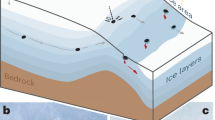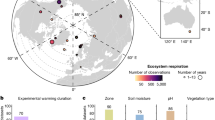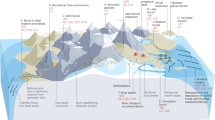Abstract
THE term 'geochemistry', like many other scientific terms, has a variable connotation. If geochemistry means simply the chemical study of the earth or parts of the earth, then geochemistry must be as old as chemistry itself, and dates from the attempts of Babylonian and Egyptian metal-workers and potters to understand the nature and properties of their materials. If, on the other hand, geochemistry is not only that, but something more, namely, an attempt to understand the distribution of chemical elements in the different parts of the earth, the migration of chemical elements and the laws of their combinations in the process of mineral formation, then geochemistry is indeed a young science. This is why the Russian geochemists claim that geochemistry is the science of the twentieth century. In saying that, they imply that science does not consist of a mere collection of data, but involves also theories and hypotheses which link up the data to form an organized whole; that a real science involves a definite mental technique in handling problems, setting up new points of view, and, in general, marshalling the results of experience. According to the Russian men of science, geochemistry is now passing from the stage of the 'data of geochemistry' to the 'science of geochemistry'; and from being a mere handmaid of mineralogy, petrology and economic geology, it is emerging as an autonomous science with its own problems, scope and methods.
This is a preview of subscription content, access via your institution
Access options
Subscribe to this journal
Receive 51 print issues and online access
$199.00 per year
only $3.90 per issue
Buy this article
- Purchase on Springer Link
- Instant access to full article PDF
Prices may be subject to local taxes which are calculated during checkout
Similar content being viewed by others
References
Vernadsky, V. I., "Essay on Descriptive Mineralogy" (St. Petersbourg, 1908–10), 1, Parts 1–3.
Vernadsky, V. I., "History of Minerals of the Earth's Crust" (Leningrad, 1925), 1, Part 1, 1933, 2, Part 1.
Vernadsky, W., "La geochimie" (Paris, 1924).
Vernadsky, W., "La biosphere" (Paris, 1929).
Fersman, A. E., "Geochemistry of Russia" (Petrograd, 1922), Part 1.
Fersman, A. E., "Chemical Elements of the Earth and the Cosmos" (Peterburg, 1923).
Fersman, A. E., "Geochemistry" (Leningrad), 1 (1933), 2, (1934). 3 (1937), 4 (1939).
Fersman, A. E., "The Search for Mineral Deposits on the Basis of Geochemistry and Mineralogy" (Moscow, 1939).
Fersman, A. E., "Pegmatites" . 1, "Granite Pegmatites" (Leningrad), 1st edit. (1931); 2nd edit. (1932); 3rd edit. (1940).
"Pegmatites of U.S.S.R.",Edited by A. E. Fersman and I. I. Ginsburg (Moscow), 1 (1936); 2 (1939).
Zviaginzev, O. E., "The Geochemistry of Gold" (Moscow, 1941). (With the exception of 3 and 4, all these publications are in Russian.)
Author information
Authors and Affiliations
Rights and permissions
About this article
Cite this article
TOMKEIEFF, S. Geochemistry in the U.S.S.R. Nature 154, 814–816 (1944). https://doi.org/10.1038/154814a0
Issue Date:
DOI: https://doi.org/10.1038/154814a0
This article is cited by
-
Prof. Alexander Fersman
Nature (1945)
Comments
By submitting a comment you agree to abide by our Terms and Community Guidelines. If you find something abusive or that does not comply with our terms or guidelines please flag it as inappropriate.



